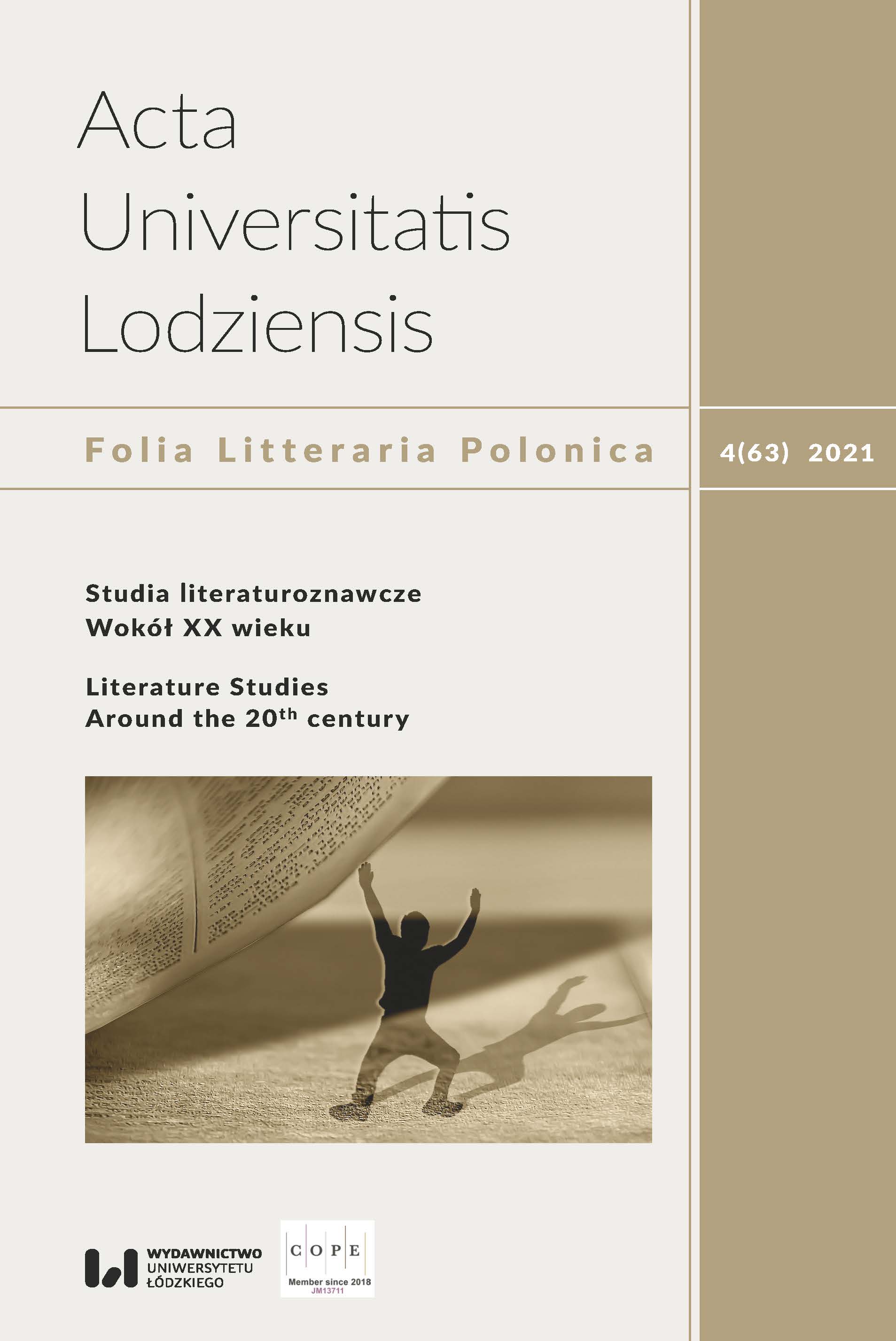Dystopijna trylogia Becketta, Część Pierwsza: O nieistotności Godota
DOI:
https://doi.org/10.18778/1505-9057.63.01Słowa kluczowe:
Samuel Beckett, Czekając na Godota, genologia tekstu, frenologiaAbstrakt
Autor analizuje szereg zmian wprowadzonych do tekstu dramatu Samuela Becketta Czekając na Godota, których dokonał autor tłumacząc tekst oraz inne osoby zajmujące się edycją manuskryptu sztuki. Opisując szczegółowo różnice między poszczególnymi wersjami manuskryptu, autor tłumaczy, w jaki sposób zmiany te wynikają z popularnych w tamtej epoce poglądów dotyczących degradacji człowieka i ludzkości. Artykuł kreśli zarówno zarys poglądów samego Becketta na te zagadnienia, jak i ogólne filozoficzne i kulturowe tło epoki. Obok tych genologicznych dociekań autor stawia tezę, że tematem sztuki Becketta jest w mniejszym stopniu nieobecności Godota, czy Boga, a w większym lęk wywołany wizją degradacji ludzkości, umierania i zaniku życiowych energii. Artykuł stanowi zatem przeglądowe omówienie stanowisk filozoficznych, które stoją za powstaniem Czekając na Godota, szczególnie monologu Lucky’ego, a także daje wgląd w historię edytowania tekstu sztuki.
Pobrania
Bibliografia
Atkinson Brooks, Beckett’s Wating for Godot, „The New York Times”, 20.04.1956, https://archive.nytimes.com/www.nytimes.com/books/97/08/03/reviews/beckett-godot.html?_r=1 [dostęp: 12.01.2022].
Google Scholar
Beckett Samuel, Czekając na Godota, tłum. A. Libera, Państwowy Instytut Wydawniczy, Warszawa 1994.
Google Scholar
Beckett Samuel, Końcówka, [w:] Samuel Beckett, Dramaty, tłum. i oprac. A. Libera, Zakład Narodowy im. Ossolińskich, Kraków 1995, s. 111–175.
Google Scholar
Beckett Samuel, The Letters of Samuel Beckett, 1941–1956, red. G. Craig et al., Cambridge University Press, Cambridge 2009.
Google Scholar
Beckett Samuel, The Theatrical Notebooks of Samuel Beckett, Volume I: “Waiting for Godot”, red. James Knowlson, Faber and Faber, London, Grove Press, New York 2019 [1994].
Google Scholar
Beckett Samuel, Waiting for Godot (1953). Numerowana kopia oznaczona jako Albery. BDMP MS-HRC-DA-145-1and HRC Texas.
Google Scholar
Beckett Samuel, Waiting for Godot, Faber and Faber, London 1956. Beckett Samuel, Waiting for Godot, Faber and Faber, London, 1965. Beckett Samuel, Waiting for Godot. Grove Press, New York 1954.
Google Scholar
Beckett Samuel, Waiting for Godot, Lord Chamberlain Plays LCP 1964/51, British Library, London 1964.
Google Scholar
Beckett Samuel, Waiting for Godot. Nienumerowana kopia oznaczona jako OSU. Columbus, Ohio.
Google Scholar
Calloway Stephen, Aubrey Beardsley, V & A Publications, London 1998.
Google Scholar
Deleuze Gilles, Claire Parnet, Dialogues II, tłum. Hugh Tomlinson i Barbara Habberjam, Columbia University Press, New York 2007.
Google Scholar
Hobbes Thomas, Lewiatan, czyli materia, forma i władza państwa kościelnego i świeckiego, tłum. C. Znamierowski, Państwowe Wydawnictwo Naukowe, Kraków 1954.
Google Scholar
McMillan Dougald, Martha Fehsenfeld (red.), Beckett in the Theater: The Author as Practical Playwright and Director, Riverrun, New York 1988.
Google Scholar
Nordeau Max, Degeneration, tłum. z drugiego wydania niemieckiego, D. Appleton and Company, New York 1895.
Google Scholar
Owens Susan, The Satirical Agenda of Aubrey Beardsley’s Enter Herodias, „Visual Culture in Britain” 2002, nr 2:3, s. 81–102.
Google Scholar
RabatéJean-Michel,Think,Pig!BeckettandtheLimitsoftheHuman,NewYorkUniversity Press, New York 2016. https://doi.org/10.5422/fordham/9780823270859.001.0001
Google Scholar
DOI: https://doi.org/10.5422/fordham/9780823270859.001.0001
Van Hulle Dirk, Mark Nixon, Samuel Beckett’s Library, Cambridge University Press, Cambridge 2013.
Google Scholar
Van Hulle Dirk, Pim Verhulst, The Making of Samuel Beckett’s ‘En attendant Godot’ / ‘Waiting for Godot’, Bloomsbury, London 2018.
Google Scholar
Pobrania
Opublikowane
Jak cytować
Numer
Dział
Licencja

Utwór dostępny jest na licencji Creative Commons Uznanie autorstwa – Użycie niekomercyjne – Bez utworów zależnych 4.0 Międzynarodowe.











